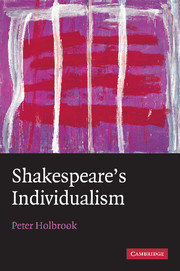Book contents
- Frontmatter
- Contents
- Acknowledgements
- Introduction
- PART I SHAKESPEARE, HAMLET, SELFHOOD
- PART II SHAKESPEARE AND EVIL
- 9 ‘Old lad, I am thine own’: authenticity and Titus Andronicus
- 10 Evil and self-creation
- 11 Libertarian Shakespeare: Mill, Bradley
- 12 Shakespearean immoral individualism: Gide
- 13 Strange Shakespeare: Symons and others
- 14 Eliot's rejection of Shakespeare
- 15 Shakespearean immoralism: Antony and Cleopatra
- 16 Making oneself known: Montaigne and the Sonnets
- PART III SHAKESPEARE AND SELF-GOVERNMENT
- Conclusion: Shakespeare's ‘beauteous freedom’
- Index
- References
14 - Eliot's rejection of Shakespeare
Published online by Cambridge University Press: 06 July 2010
- Frontmatter
- Contents
- Acknowledgements
- Introduction
- PART I SHAKESPEARE, HAMLET, SELFHOOD
- PART II SHAKESPEARE AND EVIL
- 9 ‘Old lad, I am thine own’: authenticity and Titus Andronicus
- 10 Evil and self-creation
- 11 Libertarian Shakespeare: Mill, Bradley
- 12 Shakespearean immoral individualism: Gide
- 13 Strange Shakespeare: Symons and others
- 14 Eliot's rejection of Shakespeare
- 15 Shakespearean immoralism: Antony and Cleopatra
- 16 Making oneself known: Montaigne and the Sonnets
- PART III SHAKESPEARE AND SELF-GOVERNMENT
- Conclusion: Shakespeare's ‘beauteous freedom’
- Index
- References
Summary
There is no freedom in art …
T. S. Eliot, ‘Reflections on Vers libre’ (1917), in T. S. Eliot: Selected Prose, ed. J. Hayward (Harmondsworth, 1953), 87.The view that Shakespeare was a liberalizing force in culture explains T. S. Eliot's essentially negative attitude towards him. Eliot attacked nineteenth-century ‘impressionistic criticism’ in The Sacred Wood. His target was Romantic and post-Romantic ideology. Singling out authors such as Swinburne and Symons, Eliot makes clear his hostility to the modernizing implications (individualistic, secular, liberal) of their criticism. The critical mode (or cultural malaise) represented by such writers he sums up in the word ‘sentimental’. But the ‘modern tendency’ Eliot favours – he is actually talking about a backlash against modernity – ‘is toward something which, for want of a better name, we may call classicism’: a commitment, ‘discernible even in art’, to ‘a higher and clearer conception of Reason, and a more severe and serene control of the emotions by Reason’. Eliot's anathematizing of the emotive literary criticism of the nineteenth century has a clear cultural and political agenda. The nineteenth century implied the twin pathologies of ‘[e]xaltation of the personal and individual ’ and ‘[e]mphasis upon feeling rather than thought’; and his antipathy to this civilizational phase is one of the distinctive features of his criticism. The following sentences convey a dry contempt for what he saw as the shallowness and philistine emptiness of that age:
Tennyson lived in a time which was already acutely time-conscious: a great many things seemed to be happening, railways were being built, discoveries were being made, the face of the world was changing. […]
- Type
- Chapter
- Information
- Shakespeare's Individualism , pp. 154 - 171Publisher: Cambridge University PressPrint publication year: 2010



